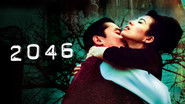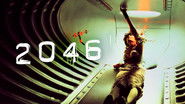saraccan
For some reason I thought this would be a sci-fi film with some romance sprinkles on it but it was the complete opposite. It was cool the way it takes you along different relationships of our main character. He's not very likeable but not dislikeable either. There wasn't a clear connection between how it started and what it told throughout the movie which was a bit confusing to me. It's about a writer and his relationships with a bunch of women.
Jithin K Mohan
"In the Mood for Love" showcased a hopeless love story, that which is lost even before its inception. "2046" portrays the hopeless attempts to overcome the repression of emotions by the repression of identity. Chow's idealized love for Su, which he lost, lead him into a state in which he can't stay true to his emotions. So he moves on without looking back only to look back at those who reminds him of his lost love, which ultimately leads to the realization that he needs to let go of the past. Chow's thoughts are further explored in the sci-fi world of his novel "2046". As each of the characters in his life is portrayed as a character in the novel, his real emotions towards them are exposed, as the writing progresses, even to him.Yearning for love is a basic human emotion that has always been a consistent theme in Wong films. Even when doing action/biography films like "The Grandmaster", the film ends up more or less about love. "2046" portrays the chaos of lost souls who are looking for love from all the wrong places and their suffering when they can't let go of the love they found or get hold of. Like every Wong film, "2046" is also at its best when the visual and musical motifs lead the viewers to feel what the characters are going through.Read full review at www.asianfilmvault.com/2017/07/2046-2004-by- wong-kar-wai.html
sharky_55
It is impossible to separate Wong Kar Wai's 2046 from its predecessor, In the Mood for Love. Tony Leung reprises Chow Mo-wan, the writer from Hong Kong who has fled from the tragic events of the previous film. 2046 is positively dripped with the melancholy that he has accumulated over the years. He looks for that same connection he found with Maggie Cheung everywhere he goes; he and the landlord's daughter co-write in the hotel room in the same manner, and in a scene permeated with nostalgic longing, he reaches over for the hand of Bai Ling, mimicking that taxi ride from In the Mood for Love. The black and white seems to suggest something that is of the past, but he is unrelenting in his search for it again. Actually, I think that 2046 can be watched on its own. What isn't possible is to ignore the connotations of ITMFL after watching both; see how Chow flirts and puts on a playboy persona, how he indulges in physical lust but shuts down any attempts to form a stronger connection. But while the tragedy of the latter was infinite in the way Chow visits Cambodia and whispers a secret that he will carry with him to the grave, 2046 feels like an awkward interlude in-between. It is presented to us in non-chronological order for no particular reason, making Chow's characterisation uneven, and WKW makes little references and nods to the trilogy; intoxicatingly beautiful women with the same name as past desires, wearing black gloves that symbolise a identical loss in the past, characters that have becomes weary in the years past after the previous movies. Doyle and co.'s cinematography is just as lush; the reds, greens and yellows seep into the screen and render a beauty that our characters seem to lack the ability to enjoy. The compositions force them into the edges of the frame and into corners as they process their grief. Two- shots are rarely used; we peek around and from behind corners like neighbours encroaching on a private affair or a telephone call made with deliberate loudness as to invoke jealously, much like the pair are immodest in their lovemaking. Mirrors are used to suggest duplicity; reflecting each facet of our character's profile but revealing none of their intent. Chow shields his heart from another affair that would seek to ruin it. As he urges Bai Ling to accept his gift, they struggle in the same shot, before she slaps him and they are separated in the frame. Later they share the same bed.2046's biggest miscue is to focus on so many lost loves and opportunities, and make them unrelenting in their grief and regret. ITMFL was tragic because each moment was heightened to its utmost sensuality and slowed down to a agonising pace - but still they could not consummate the affair. 2046 is as physically lush, but each different period and each different girl proves to be less and less effective. The sci-fi element of it all is based on Chow's novel; the flashy, shimmering CGI landscapes transport us to an alternate time and the scenes in the train are drenched in red - but the entirety of this subplot is merely a metaphor for Chow's longing for the landlord's daughter. There's nothing sensual or erotic or tragic about the way he tries to woo the android - despite his claims. WKW's handling of these segments is, ironically, robotic-like. He again slows down moments of poignancy to their extremes, and fills our ears with opera and mournful strings, but these moments seem less deftly picked that before. A new, unwanted element is Chow's droning voice-over, which seeks to elicit the maximum amount of anguish from each encounter. Zhang Ziyi sobs into a doorframe as Chow rejects her for the last time, but the performance is not allowed to excel on its own; Chow interrupts with his narration, wistfully remembering that this was the last time that they ever saw each other. As if we couldn't already figure that out by ourselves? Chow and the Black Spider embrace for the last time, and then she has to acknowledge it openly and sob against the wall, but how long have we really been given to drown ourselves in reminiscing of the relationship's similarities to the past? The moment of agonising goodbye does not feel earned. We end on the camera barrelling towards a dark hole, beckoning for a secret; only in this case, it is numerous secrets, but none are as potent as Chow's previous affair.
dwpollar
1st watched 2/20/2010 -- 7 out of 10(Dir-Wong Kar Wai): Painful yet beautiful film about lost loves and how those affected the main character played by Tony Leung. This is a strange, stylistic film about a writer and his experiences with various women in his life. He then uses those experiences to write a story set in the year 2046(which also happens to be the hotel room number where many of those experiences took place). The heroine in the story goes to this year to bring back lost memories because supposedly the memories will never be lost there. The movie bounces back and forth between the real story and the written story so it's really hard to follow and is hard to understand unless you watch the whole movie. The core is about how the main character lost a love who decided not to go with him to Singapore. He then becomes very loose and beds many women. He has a sexual relationship with a woman in room 2046 and then has a very fatherly relationship with the next inhabitant of that room. The written story ends on a sad note as does the real life situation. The character can only relate to loss. The filmmaker, Wong Kar Wai, uses a lot of visual styles to tell the story and includes music that makes it feel like a sad opera. This is one of those movies that will be hard to revisit but is a one-of-a-kind film and shouldn't be missed. If you've ever lost a love in your life -- this film will bring it to the surface and I think that is what the filmmaker intended. Well done throughout, but don't watch it alone because you won't want to be after it's over.


